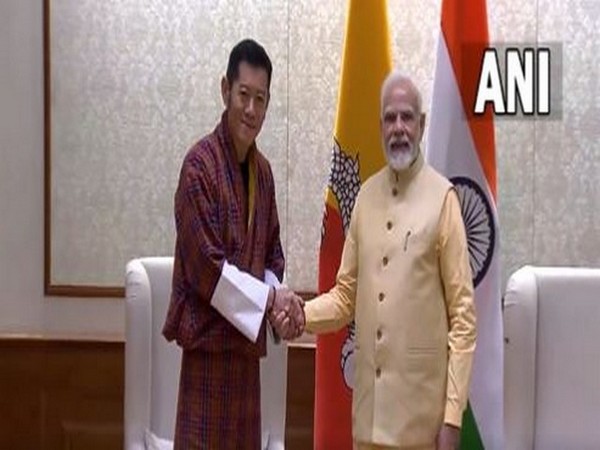PM Modi meets King of Bhutan Jigme Khesar Namgyel Wangchuck
Prime Minister Narendra Modi on Wednesday met the King of Bhutan, Jigme Khesar Namgyel Wangchuck.

- Country:
- India
Prime Minister Narendra Modi on Wednesday met the King of Bhutan, Jigme Khesar Namgyel Wangchuck. Wangchuck also met Foreign Secretary Vinay Kwatra and will also meet National Security Advisor, Ajit Doval today.
Bhutan on Tuesday ratified the International Solar Alliance Framework Agreement. "Ambassador of Bhutan to India Maj Gen Vetsop Namgyel handed over the instrument of ratification to Secretary ER Dammu Ravi, in the presence of DG International Solar Alliance," tweeted the Ministry of External Affairs spokesperson Arindam Bagchi.
The basic framework of India-Bhutan bilateral relations was the Treaty of Friendship and Cooperation signed in 1949 between the two countries. It called for peace between the two nations and non-interference in each other's internal affairs. The Treaty was revised in 2007.
However, Bhutan agreed to let India guide its foreign policy and both nations would consult each other closely on foreign and defence affairs. The diplomatic relations were established in 1968 with the establishment of a special office of India in Thimphu.
There are a number of institutional and diplomatic mechanisms between India and Bhutan in areas such as security, border management, trade, transit, economic, hydro-power, development cooperation, water resources etc. Bhutan shares its border with four Indian states - Assam, Arunachal Pradesh, West Bengal and Sikkim with a length of 699 km and serves as a buffer between India and China.
Bhutan is important to India as a buffer state as it acts as a defence against China by protecting the chicken neck corridor. The Siliguri Corridor, or Chicken's Neck, is a narrow stretch of land of about 22 kilometres. It is located in the Indian state of West Bengal, which connects India's north-eastern states to the rest of India, with the countries of Nepal and Bangladesh lying on either side of the corridor.
The Doklam stand-off re-established the strategic significance of Bhutan for India. The trade between the two countries is governed by the India-Bhutan Trade and Transit Agreement of 1972. India is Bhutan's largest trading partner.
The relationship between the two countries benefits the North Eastern States with increased trade and commerce relationship with Bhutan will be highly beneficial to landlocked Arunachal Pradesh and Assam. India has constructed three Hydroelectric Projects (HEPs) in Bhutan: Chukha HEP, Kurichhu HEP, and Tala HEP, operational and exporting surplus power to India.
Recently, India completed a 720 MW Mangdechhu Hydroelectric Power Project and both sides are expediting the completion of other ongoing projects including the 1200MW Punatsangchhu-1 & 1020MW Punatsangchhu-2. Bhutan is the first country to receive the Covishield vaccines under India's Vaccine Maitri Initiative.
The Road ahead for India-Bhutan ties is one of tremendous potential and opportunities. Both countries must enhance connectivity which is a central pillar of India's 'Neighbourhood First' and 'Act East' policies. (ANI)
(This story has not been edited by Devdiscourse staff and is auto-generated from a syndicated feed.)










